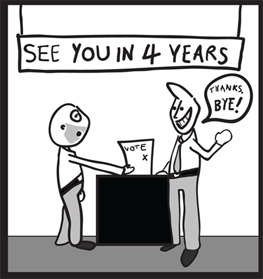
by Daniel Penisten
Direct democracy is part of a vision of a better America and a better world. But right after one entertains that great idea, one comes to the realization that the essential social ingredient needed for direct democracy is not yet evolved. We The People have a long way to go before we can become strong enough to run our nation as a successful direct democracy.
Direct democracy, where all laws and acts of government are decided directly by the people and without representatives, is a worthwhile dream. But a people strongly individualistic in nature and habit, and kept busy with the challenges of everyday living, might find it very difficult to participate well in a direct democracy. However, this evolution can be helped and we can build and maintain a government that is truly of, for, and by the people. We only have to really want to.

Joshua Pritikin, a leader in the formational stages of American direct democracy, put forth a call for someone to read and share their views about the work entitled Citizen Competence and Democratic Institutions by Stephen L. Elkin and Karol Edward Soltan. I hesitated, feeling unsure about my qualifications for this task but since no one else stepped forward to do this good deed, I did.
Citizen Competence and Democratic Institutions is an extensive work, at 404 pages, built by twenty good minds. Including the foreword, the book contains seventeen articles distributed among four parts. Each part addressing a specific aspect of the concept of Citizen Competence including “What Is Civic Competence”, “The State Of Civic Competence”, “Strengthening Citizen Competence,” and a fascinating conclusion.
Immediately when beginning to read the book, I was amazed at the expertise of the contributors who have spent considerable time and energy thinking about this concept. They have dared to delve more deeply into the ramifications of this ideology than I have seen expressed anywhere else. The result is powerful in its effect on the average mind…either recoiling in fear from the detail and complexity of the scientific studies or ranging to real excitement at the gem-like insights regarding the possibilities of direct democracy in the modern world.
Encouraging as well were the references to earlier thinkers about direct democracy and their historical works. These helped me to understand that this dream of the common man is not a new thing. Thinkers such as Robert Dahl who wrote Democracy and Its Critics, Jürgen Habermas (Knowledge and Human Interests), Charles W. Anderson (“How to Make a Good Society”), and many more have contributed to the wealth of information on this topic.
The book also had information about societies and places, such as the Committee on the Political Economy of the Good Society (PEGS), the American Talk Issues Foundation, and the Highlander Research and Education Center on the Cumberland Plateau. All of these are active places where a dedicated advocate and student of evolving direct democracy can go to grow.
Then there are the graphs and math of studies into related areas of Citizen Competence used to expose some of the challenges of direct democracy. I will personally be referring to these regularly now when I dare to touch the details of this worthy cause.
Throughout the articles were sprinkled the food for thought I needed to see about direct democracy. For example in chapter 10, which discusses educational considerations for Citizen Competence in Direct Democracy, Israel Scheffler suggests that, “education must encompass the formation of habits of judgment and the development of character, the elevation of standards, the facilitation of understanding, the development of taste and discrimination, the stimulation of curiosity and wonder, the fostering of style and a sense of beauty, the growth of a thirst for new ideas and visions of the yet unknown. In short, we have a problem.” This was tasty meat for me, as well as encouragement to continue in my advocacy of direct democracy as the potentially most ideal human social form.
In summation, I have to say that I am so very glad that this book was written and I am so very grateful to its contributors for their worthy efforts in it. Direct democracy is a dream worth building towards. It has become a vital ingredient in my personal growth, such as this may be, as one who thinks of a well built direct democracy as the path to greatness and brightness for our species.
Kat Penisten says
I forgive you for spending so much time with your head in books and on the Web in preparation for this article. I am proud of you! Good job! Your “Sweety”. Kat
Daniel Jones says
Well. Here it is 2018 and the struggle continues. I think “Direct Democracy” is more important to a “World Of Peace” than it has ever been. More and more of Us are finally realizing this and this has brought more strength and growth to the movement.